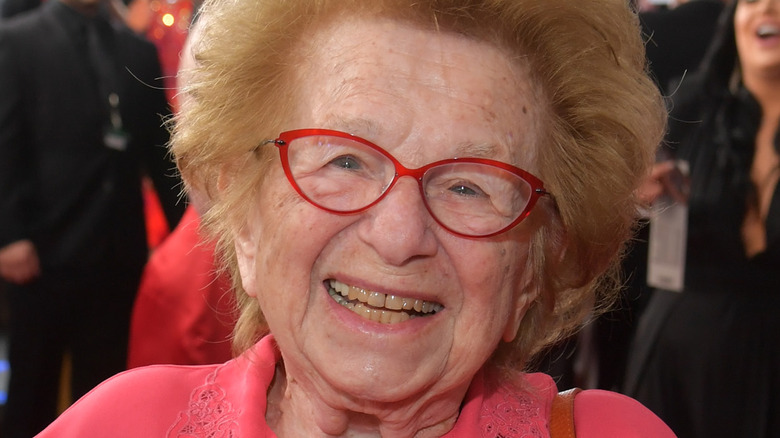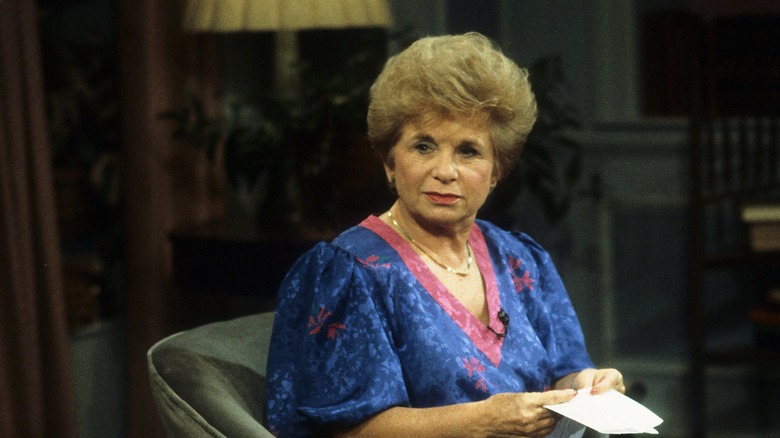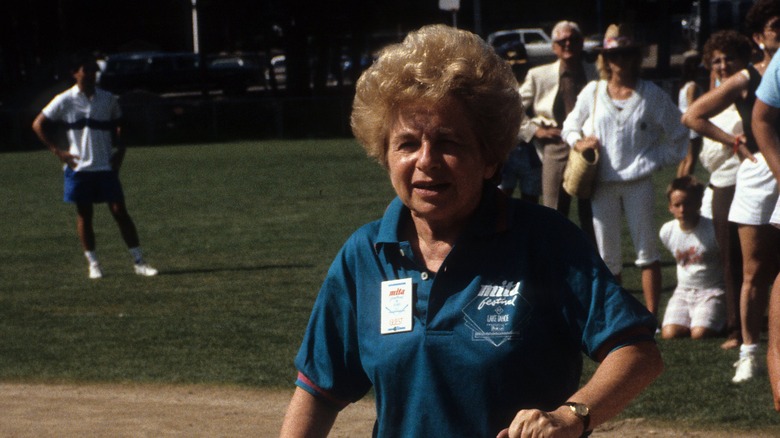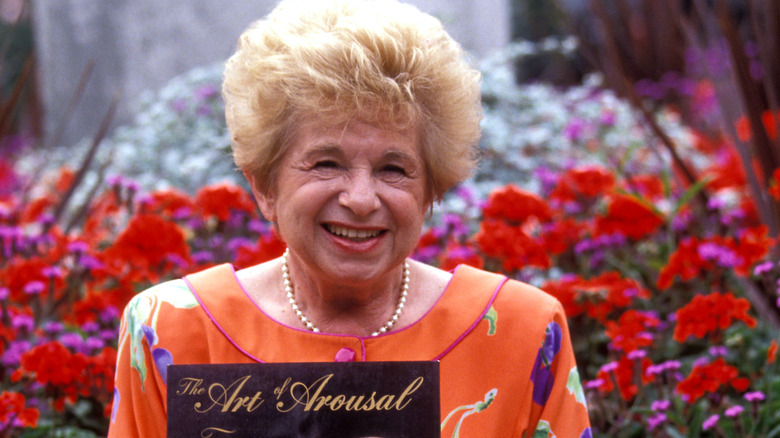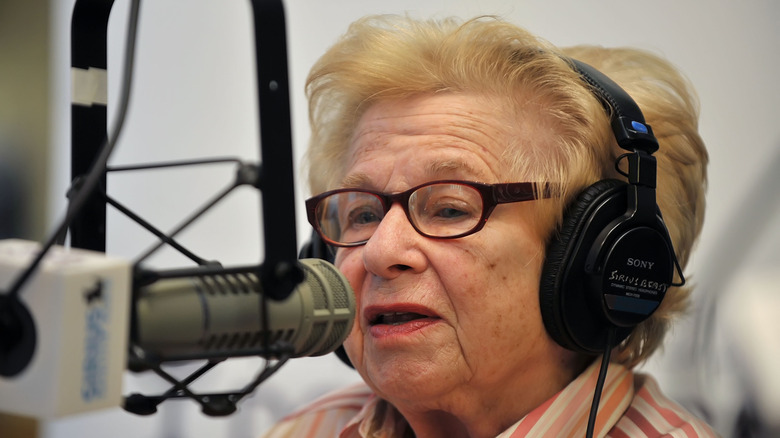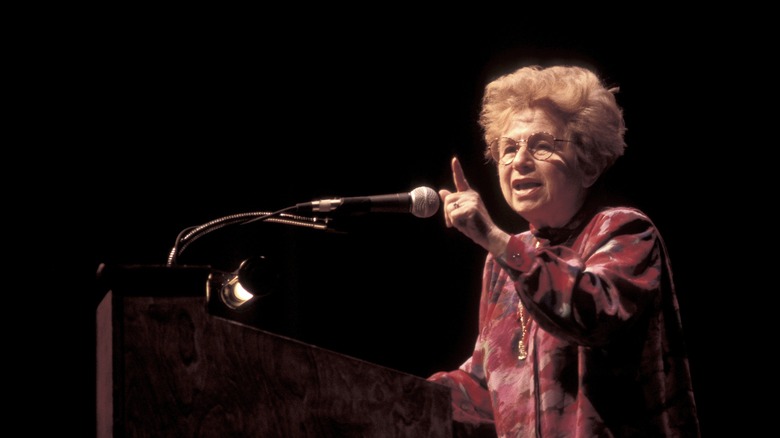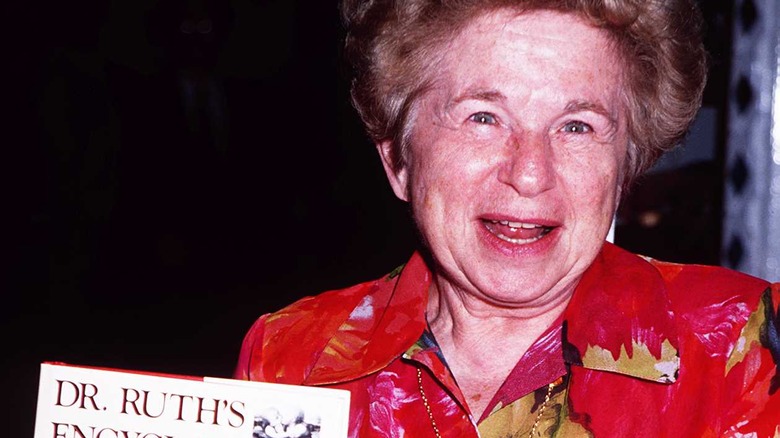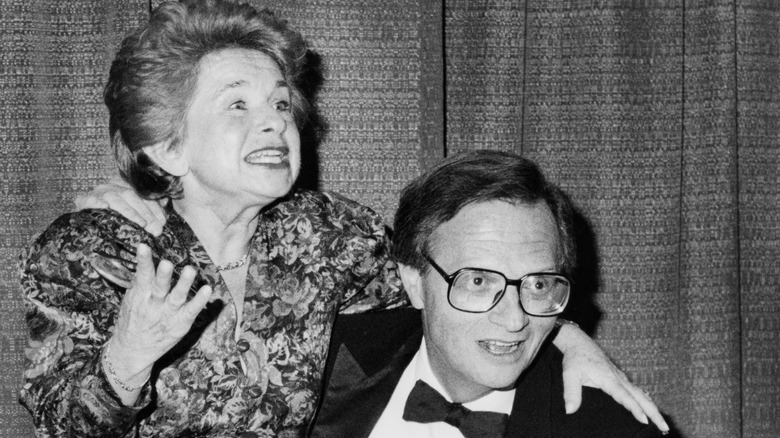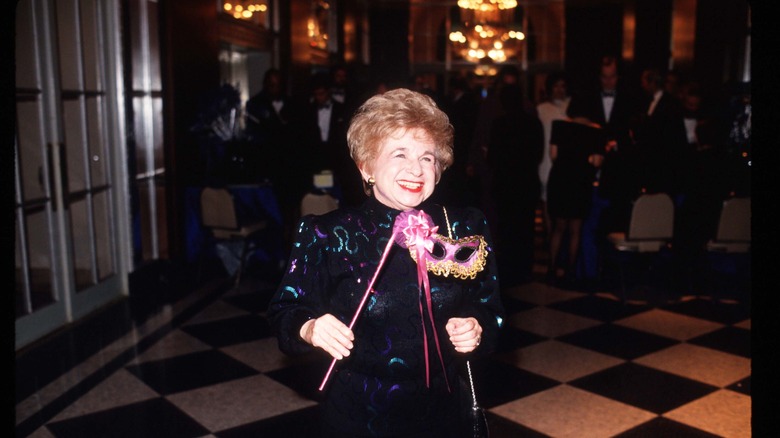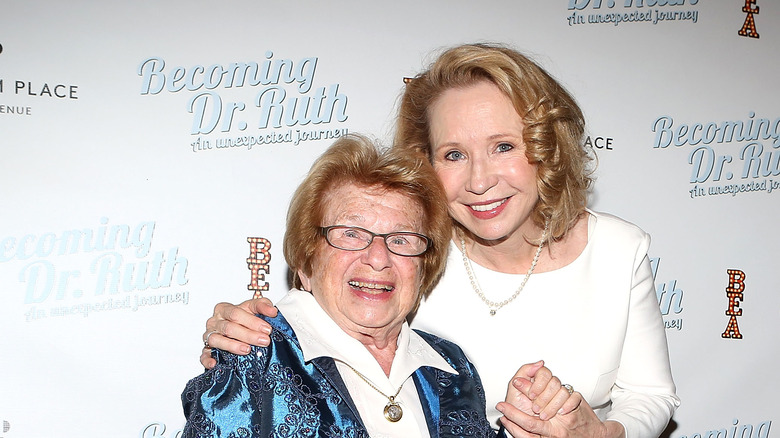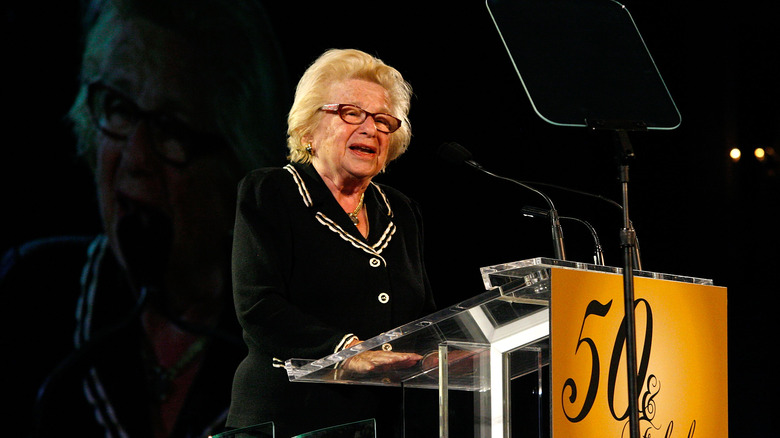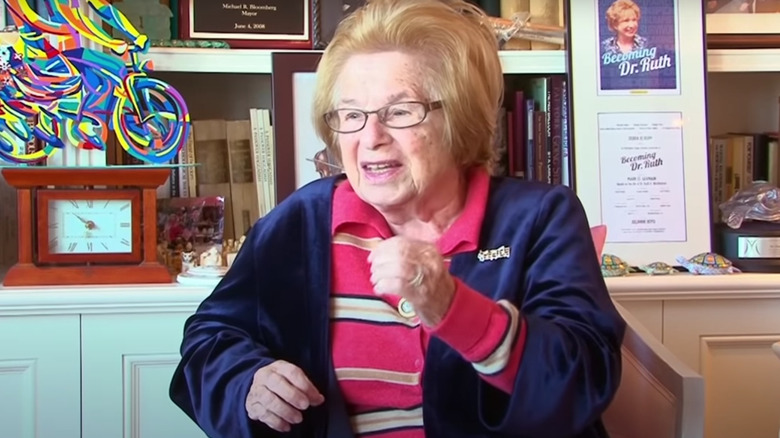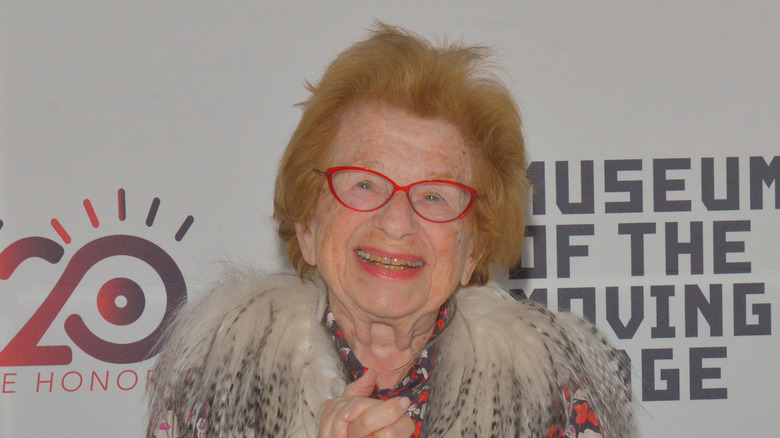The Untold Truth Of Dr. Ruth
Dr. Ruth Westheimer became an unlikely celebrity in the 1980s by teaching America how to speak about sex, charming talk show audiences with her distinctive German accent and frank approach to modern love.
Those audiences weren't aware of the painful past behind her journey to the United States, however, or how this diminutive middle-aged woman had lost her entire family in the Holocaust. As she told The Guardian, Westheimer only escaped the same fate because she had been sheltered in a Swiss orphanage. In the therapist's words, her parents had gifted her with life "once when [she] was born, and once when they sent [her] to Switzerland." She stayed quiet about the tragic loss of her family for many years.
But as Westheimer told NPR, the numbers of living Holocaust survivors are dwindling. "So I do stand up to be counted because people like me who are Holocaust survivors, in that sense, have to stand up to be counted. Very few of us are leftover," the therapist explained. She also felt moved to share her experiences because of the modern-day treatment of immigrants. "I have stayed away from politics because I talk about sex from morning to night," Westheimer admitted but revealed that she does feel sympathy for families who are torn apart. "I do talk about how upset I am when I see children being separated from their parents because that's the story of my life." This is the untold truth of Dr. Ruth.
She nearly had her legs amputated
After the tragedy of Dr. Ruth Westheimer's early life, she traveled to the Middle East and became a trained sniper in the Palestine Wars.
The therapist later told the New Yorker that her joining the war was "not an act of heroism," explaining that "everybody in then-Palestine belonged to some group" in 1947. She chose the underground movement that would later become the Israel Defence Forces, discovering in the process that she had an unexpected talent for shooting. "I did not know that I had good aim," Westheimer recalled.
According to The Guardian, she perfected her skill "by imagining Hitler was her target." The therapist never actually shot a human being, however. "I have no idea what the experience would be, if I had to show it," she mused in her interview with the New Yorker. "But I was a very good sniper. I could put the five bullets in the red circle. And I know how to throw hand grenades." Her military experience came to an end when she was badly injured in a bombing. As Westheimer revealed in her 2019 documentary, per Kveller, both legs were so severely wounded that she almost needed amputation. Her ability to flirt was still intact, however, and she managed to persuade an attractive male doctor to help her eat by pretending that her arms had been hurt.
Dr. Ruth used to be self-conscious about her height
Dr. Ruth Westheimer's unassuming height has always been one of her defining characteristics. The therapist stands at only four foot seven, and as she told the Harvard Business Review, she's "lost a quarter of an inch" in recent years. "I can't lose any more, because then you won't see me — though you'll still hear me!" she joked.
As From the Grapevine reported, Westheimer used to be self-conscious about her height when she was a teenager, worrying that it would affect her future love life. "Nobody is going to want me because I'm short and ugly," she confided in her diary. Although it made her an unlikely sniper, the sex therapist has claimed that in reality, being short never held her back.
"It never hurt me," she told the Harvard Business Review, recalling how she used her height to her advantage as a student in Paris, after moving away from Israel. "On the contrary, I was lucky to be so small, because when I was studying at the Sorbonne, there was very little space in the auditoriums and I could always find a good-looking guy to put me up on a windowsill."
She turned down speech therapy
Dr. Ruth Westheimer became a beloved radio personality thanks to her unique voice, but her strong German accent wasn't always an advantage.
After the sex therapist initially moved to the United States, the Americans she met had trouble understanding her. "When I came to this country, people told me that if I wanted to teach and work here, I would have to take speech lessons to lose my accent," she told the Harvard Business Review. But Westheimer, a recently divorced single mother at the time, couldn't afford it.
"At the time I made one dollar an hour in market research. I certainly didn't have money or time to do speech lessons," she later recalled, speaking to Theater Mania. And in the end, her unforgettable voice allowed Westheimer to make a name for herself: as she argued in the Harvard Business Review, the accent helps her address sexual topics without scandalizing anyone. "It helped me greatly, because when people turned on the radio, they knew it was me," she added.
Planned Parenthood inspired her to study sex
Although she was making "one dollar an hour in market research" when she first arrived in New York, Dr. Ruth Westheimer's academic studies soon led her to another career path.
The psychologist was a working single mother when she started attending night classes in counseling at Columbia University, per From the Grapevine. She had originally hoped to train as a pediatrician because of her unusual height. "At the age of nine or ten, I wanted to be a doctor," she told Theater Mania. "I wanted to be a medical doctor, a pediatrician, because I knew that I was short and I thought I'd be a good pediatrician for children."
Westheimer never suspected that she would become an expert on sexuality until she started working with Planned Parenthood in a part-time role. "I trained professionals to be family-planning counselors, and I thought, my gosh they talk only about sex — they don't talk about culture or literature," she noted. "And then maybe a few hours later, I thought, what an interesting subject matter." When Westheimer began talking to patients about sex, she realized that the general public had a lot to learn.
A 15-minute radio show made her a star
Dr. Ruth Westheimer became an accidental overnight sensation after volunteering to give an unpaid lecture.
As she told the Harvard Business Review, New York radio was introducing more community services at the time. "So a letter came to Cornell University Medical Center, where I was training to be a sex therapist. Would one of us address the meeting of community affairs managers?" the therapist recalled. "Nobody wanted to, because there was no money attached, but I said, "I'll go.'" Her speech left an impact on the room and soon a radio commissioner had reached out for an interview. WNYC gave Westheimer her start in broadcasting, with a "fifteen minute, taped show that aired Sundays after midnight" called "Sexually Speaking." The therapist started answering questions live on air and the show grew in popularity, eventually expanding to two hours.
"I had fun with it," she told Esquire. "I thought it was great, they're listening to somebody, a short person 4-foot-7, immigrant to this country." Although Westheimer wasn't aware of exactly how successful the show was, she received an award for her charismatic sex advice. "I did it for 10 years. Every Sunday night. And it went all over the country and Canada. Only then did I do the cable television," she recalled.
Her frank sex talk almost provoked a citizen's arrest
Although Dr. Ruth Westheimer mostly managed to get away with discussing sexual topics on radio and TV, there was one incident where an audience member thought she had gone too far.
Her matter-of-fact tone usually helped to pacify viewers, as she explained to the Harvard Business Review. "I was 50 when I had my first show, so I was never on television with a short skirt or décolleté," the therapist offered, adding that she didn't even attempt a makeover. "Maybe that's one secret." She always used textbook terms, rather than innuendos, which also made the discussions seem innocuous. "I was also very well trained — I was fortunate to work for seven years at Cornell with Helen Singer Kaplan, who wrote the most important textbook on sex therapy — and I was explicit in my answers," Westheimer commented, emphasizing her academic credentials.
When she spoke at Oklahoma State University in 1985, however, one audience member was particularly scandalized by her addressing homosexuality. As seen in her documentary, per She Knows, the man threatened to perform a citizen's arrest. "A publicity-seeking politician tried to make a citizen's arrest, which didn't happen," Westheimer recalled, speaking to the Boston Globe. "Was I scared? No, because I was a sniper in the Haganah. Did it worry me? Yes, having escaped Nazi Germany."
She was a single mother and never gave her kids the sex talk
Dr. Ruth Westheimer has two kids from three different marriages. And as The Globe and Mail noted, she never talked to her own children about the birds and the bees.
"You can't avoid it, because it's the most interesting subject in the world," the therapist admitted to Us Weekly, describing how she indirectly educated her two kids. "So here's what I did. I brought home books and I put it on the table. And I did say, I want to be an askable parent." Westheimer told her children that if they were curious about anything, they should ask her directly. "If I don't know, I'll say I don't know but I'll find out," she added, admitting that she would "ask an expert."
"And make sure that the message is: 'This is not something dirty, this is not something not to be talked about,'" the radio personality warned parents, adding that no one has to talk about their own private sex lives. "Some parents, it can be the mother or the father, are better at talking about sex than others."
She turned down Saturday Night Live
Thanks to her distinctive voice and willingness to talk frankly about sex, Dr. Ruth Westheimer started to become a popular guest on late-night shows. She tried to stay connected to the academic world, however, rather than diving at the opportunity to be famous.
"I may have been on the cover of People and gone on David Letterman and Arsenio Hall because they had young audiences I wanted to talk to," the radio personality explained to the Harvard Business Review, emphasizing the importance of educating younger generations about sex. "But at the same time, I always did serious books or taught seminars. I was very conscious of that."
Westheimer also claimed that she "declined many more media offers than I said yes to," including a certain iconic late-night sketch show. "For example, when 'Saturday Night Live' asked me to host a show, I said no thank you, because I would have had to spend a whole week rehearsing," she revealed. Cast member Mary Gross did play Westheimer on "Saturday Night Live," however, so at least the sex therapist appeared on the show in spirit.
She stood up for the LGBTQ community during the AIDS crisis
One of Dr. Ruth Westheimer's most controversial stances was standing up for the LGBTQ+ community during the 1980s when homophobia was rampant due to the AIDS crisis.
As She Knows reported, a documentary about her life showed the sex therapist pushing back against the mainstream view of AIDS victims at the time. "I believe as a society we have to give these people respect," she argued, declaring that "respect is not debatable." Ryan White, who directed the documentary, told Vice that Westheimer "was at the forefront" of gay rights. "I met her friends from her orphanage saying even when she met gay people throughout her life in the 30s, 40s, and 50s she was always accepting of those people and always saying that people should be treated with respect."
When Esquire asked Westheimer what she was most proud of, she mentioned her work around the AIDS crisis and the LGBTQ community. "That was many years ago when there was not so much talk about gay rights," she recalled, explaining her motivation behind standing up for them. "Because coming out of Nazi Germany, I wanted to stand up to say everybody deserves respect."
She's inspired documentaries and Off-Broadway shows
Dr. Ruth Westheimer's remarkable life has been immortalized through her many books, as well as the documentary "Ask Dr. Ruth" and an Off-Broadway play about her life starring Debra Jo Rupp.
The documentary's director Ryan White called her life "a true immigrant story, a refugee story," per Vice. He also spoke about how thrilling it was to know her in real life. "This is not some character that she puts on," White insisted, expressing his respect for her work as an educator. "She really is that kind and empathetic and positive, which is incredible considering what she survived."
The play "Becoming Dr. Ruth" also celebrated her fascinating journey, and, according to Theater Mania, the therapist was so happy with the show that she attended "every few days" and carried around promotional postcards. "I'm not calling it off-Broadway, I'm calling it near-Broadway," she joked. Westheimer also expressed her amusement at the fact that Rupp had to go through vocal training in order to recreate her distinctive German accent, when the psychologist herself had once been urged to stamp it out through speech therapy.
She didn't consider herself a feminist
Despite Dr. Ruth Westheimer's progressive approach to taboo subjects, the sex therapist never used to identify as a feminist. She has been consistently pro-choice throughout her career, from her work with Planned Parenthood to her discussions about abortion as a public figure. But the therapist never felt a particular connection to the term feminist or cared about feminism as a movement. "It's a label that doesn't fit right with me," Westheimer told The Globe and Mail, defending her position. "I have to be true to what I think because that's my whole career."
She also sparked controversy in the #MeToo era by criticizing modern emphasis on consent. "This idea that once you are aroused and have already started that you should then ask, 'Can I touch your left breast, or your right breast?' is just nonsense," Westheimer told The Guardian in 2019, dismissing, "Nobody has any business being in bed, naked –- two guys, two women, or a man and a woman –- if they haven't decided to have sex."
Eventually, in her 2019 documentary, her daughter and granddaughter convince her to identify as a "non-radical" feminist. And in an interview with Stylist, she was happy to confirm that her mind had been changed. "I'm a feminist –- I want equal pay for equal work, I certainly am for all those things –- but I'm not for burning bras."
She's lived in the same apartment building since 1956
When Dr. Ruth Westheimer moved to America, she settled into a New York apartment in Washington Heights and never looked back. Even though Westheimer now has a net worth of $3 million, according to Celebrity Net Worth, the sex therapist has lived in the same building since 1956.
In an interview with The New York Times, Westheimer described how she fell in love with the area at first sight. "I came to this apartment and the first second that I looked out at the Hudson, at the George Washington Bridge, at the Palisades, I decided that's what we need," she explained. The diverse immigrant community was also a draw, according to Westheimer. "Home is something very sacred, especially for people like me who are immigrants," she added.
After the death of her beloved husband Fred Westheimer in 1997, the radio personality did consider moving "for two minutes," but decided against it. "That thought immediately was replaced by that word 'home.' So this is really my home and this is where I stay," she told The New York Times. And the apartment is close to Fort Tryon Park, where a bench memorializes the late Fred, per The Guardian. "My beloved has gone down to his garden to gather lilies," reads the bench's inscription, which was left by Dr. Ruth herself.
She's still giving advice
Dr. Ruth Westheimer may be a grandmother in her nineties, but she's still telling younger generations how to date.
As she told The Times in 2019, modern love presents very different problems from the sexual dilemmas of her day. "Where once women complained about their orgasms and men about premature ejaculation, the questions these days are more often about loneliness and finding meaningful human contact, which I find terribly sad," the therapist mused. Westheimer also had advice for young people dating in the aftermath of COVID-19, as she told The Atlantic. "I hope that right now people should be optimistic again. Definitely single people should say, 'Okay, the time has come for me to find myself a partner,'" she commented, stressing the importance of love and physical touch in hard times.
"And that's from my experience as an orphan of the Holocaust," Westheimer added, explaining that it's possible to move on from terrible events. "If I hadn't had the inner strength to keep on and go on, I wouldn't be Dr. Ruth."

